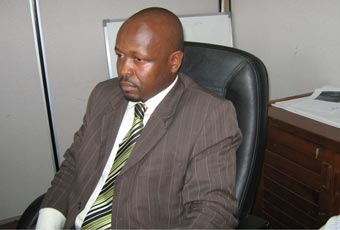
By Patrick Kagenda
Capital market rues over Uganda’s oldest brokerage firm
In January this year the Merchant Bank of East Africa(MBEA), Uganda’s oldest stockbrokerage firm, was handling the issuing of the National Insurance Corporation Initial Public Offering. Their office on Plot 44 Lumumba Avenue in the plush Nakasero neighborhood was bustling with energy and optimism.
The seven room office was filled with elderly men and women talking on the phone, checking the latest quotes, and waiting to invest their pension checks and savings.
Six months later, the scene at MBEA’s office is drastically different: dust has started to accumulate on the reception desk and the computer is switched off. There are still people in the office, but they are silent and look distracted.The tile floor looks like it hasn’t been mopped in days.
“Can I see Andrew Owiny?” I ask the receptionist.
She looks up at me. Her eyes look heavy. “Sorry, Owiny is out of the country and won’t be back for two more weeks.”
I ask to speak to the Head of Sales and Trading, Davis Gathari, but he claims to be too busy to speak. Ever since the MBEA was suspended by the Capital Markets Authority (CMA) earlier this month from trading at the Ugandan Security Exchange, MBEA employees have been hesitant to speak to the media. Their suspension, initially, caused chaos on the market, however clients relaxed when they discovered their funds had not been tampered with and were safe with Crested Stocks. The brokerage firm serves approximately50 percent of the clients in the Ugandan stock market.
Things began to fall apart for the eight-year-old MBEA at the onset of the global financial meltdown in Nov 2008. In New York as investment bankers watched in awe, the NYSE in a period of four months from Aug to end of Nov 2008 had lost twenty five percent of its value, the Ugandan stockbrokers helplessly stood by in horror.
“I wish I knew comprehensively how Uganda will be affected,” said central bank governorTumusimeMutebile during a press conference at the time. “There is no comprehensive plan available but I can tell you that we are prepared to deal with any situation that may arise affecting the economy,” he said trying to reassure the country.
Meanwhile, the Ugandan economy was taking an unprecedented battering. By the end of November 2008, experts in the Forex market told The Independent that up to US$1.5 million (Shs 2.9 billion at the time ) was being sucked out of the Ugandan money market on a daily basis. Offshore investors had started to exit the Ugandan market in fear of the effects of the global financial meltdown. One company that was hit disproportionately hard was the MBEA. Because of its reliance on foreign investors and a lack of partnership with any commercial bank, MBEA had no cushion to sustain the shock. Instead, they started depending on the two per cent brokerage fee they charge for transactions for capital. Still, they were incapable of raising the Shs15 million in net capital that was required by the CMA to operate.
But MBEA’s problems, according to Calvin Waibale, the Head of Information Technology and acting CEO of the USE were long overdue. “We had been giving them opportunity to reform but they never did. All along their liabilities exceeded their assets.”
Another source who preferred not to be named told The Independent, MBEA’s problems are linked to their market penetration method: they initially underpriced their services instead of adopting the skinning method and waiting to drop their prices until they were profitable. “They wanted to undercut the other brokerage firms only to end up under cutting themselves,” said the source.
MBEA is also said to be heavily indebted. NSSF is demanding Shs 400 million for Pay AsYou Earn (PAYE) while Uganda Revenue Authority (URA) is also demanding Shs 400 million in taxes.
The man charged with fixing this problem is Andrew Owiny. As MBEA’s CEO for the past eight years, he has watched his company grow into an elite firm and fall to grass. Owiny, a shrewd business man, is known for his simplistic lifestyle. Prior to joining the investment-banking field, Owiny worked with the central bank of Uganda and Makerere University and is on the board of several merchant banks and discount houses in Ghana and Zimbabwe.
Owiny has an MBA in Finance and Accounting from the Wharton School of the University of Pennsylvania and a Bachelor of Commerce degree in Finance from Makerere University. He is the founder of MBEA and will not take its failure lightly.
“We had capitalization problems but we are working hard to overcome them and we will soon return to business” he said on the phone from Kigali, Rwanda, where he has opened a brokerage branch of MBEA and is eyeing the Rwanda Breweries and Soft Drink Manufacturers (BRALIRWA) IPO.
“What happened is not a suspension but something to do with the renewal process. In business these things happen. However, it is unfortunate that some people want to construe it negatively.” The Chief executive at the CMA Japheth Kato said, “We hope MBEA will sort itself out and come back to the market”. “We have a responsibility to enforce the rules of trading and that is what we did,” he said.
 The Independent Uganda: You get the Truth we Pay the Price
The Independent Uganda: You get the Truth we Pay the Price


